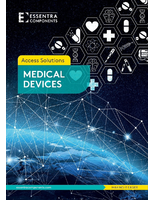Publish-Subscribe Middleware is based on DDS v1.0 standard.
Press Release Summary:
Utilizing Data Distribution Service (DDS), NDDS (Network Data Distribution Service) middleware and tools facilitate building real-time distributed systems. Communication is established when publishers register data produced with middleware and subscribers register data they are interested in receiving. Developed with consideration for requirements of real-time and embedded systems, product minimizes need for data copies and allows application to pre-allocate resources.
Original Press Release:
Real-Time Innovations Offers First Commercial Product Based on Data Distribution Service Standard
NDDS Middleware and Tools Facilitate Building Real-Time Distributed Systems for Industrial Control, Medical, Mil/Aero and Telecom Applications
BOSTON, MA-September 13, 2004-Real-Time Innovations, Inc. (RTI), a leading provider of software tools and middleware for distributed real-time systems and embedded applications, today announced the availability of NDDS (Network Data Distribution Service), RTI's publish-subscribe middleware, based on the Object Management Group's(TM) (OMG(TM)) Data Distribution Service (DDS, V1.0). DDS specification standardizes the software application programming interface (API) and underlying communications model a developer can use to create distributed applications. DDS is based on the simple, yet powerful, Data-Centric Publish-Subscribe (DCPS) communications paradigm that offers the application developer a high level of abstraction and yet controls all the Quality of Service (QoS) parameters needed for deploying real-time systems.
RTI's NDDS publish-subscribe middleware has been integrated with the DDS API. This commercial-off-the-shelf (COTS) implementation offers a high-degree of fault tolerance while reducing schedule risks, initial development costs and total cost of system ownership. NDDS also provides greater flexibility in terms of platforms, languages and transport mechanisms. NDDS' robustness and flexibility are critical to distributed real-time systems such as simulators, telecommunications, industrial automation, medical equipment, factory automation and avionics.
"The finalization and availability of the DDS specification really is a tremendous achievement that addresses a significant need in both the government and civilian commercial sectors," noted Dr. Richard Soley, Object Management Group's chairman and chief executive officer. "The DCPS model stands as a natural complement to the object-centric client-server model provided by CORBA® implementations. The DDS standard culminates a persistent effort to ensure that a worldwide data distribution standard is freely available."
A requirement common to most real-time distributed applications is the need to pass data between different subsystem modules. These modules may be on different processors or spread across multiple computers connected through a transport mechanism such as Ethernet, shared memory or a backplane such as VME. These subsystems gather and generate data through interfaces with sensors, monitor and process data, or control and communicate with other subsystems.
Under the DDS standard, developers specify various QoS parameters such as rate of publication, rate of subscription and how long data is valid throughout the network. Devices sending data become publishers and are only concerned with the specific data type they communicate. Devices needing specific information are subscribers and only need to know about the particular data they wish to receive.
NDDS takes advantage of the capabilities inherent to the DCPS model to offer a high-quality implementation developed with the requirements of real-time and embedded systems in mind. NDDS minimizes the need for data copies resulting in increased performance. Also, NDDS allows the application to pre-allocate resources, increasing reliability and real-time determinism.
"The DCPS communications model excels at efficiently distributing data between applications," states Gerardo Pardo-Castellote, Real-Time Innovations' chief technology officer and co-author of the DDS specification. "Establishing communications is simple. Publishers register data they will be producing with the middleware and subscribers register the data they are interested in receiving. The publisher just sends-or publishes-the data. This model is robust, efficient and data-centric. We are proud to offer the first commercial DDS implementation that meets the needs of many real-time systems."
Price & Availability
NDDS has been shipped to selected customers and is immediately available in a limited-access version starting at $46,920 USD for a three-user license.
About RTI
RTI (Real-Time Innovations, www.rti.com) provides software tools, middleware and professional services for distributed real-time systems and embedded applications. For over 10 years, with more than 10,000 seats in use, the ScopeTools product line has been helping embedded system developers produce higher quality, more reliable solutions. The NDDS middleware and tools provide seamless communications and comprehensive tools for distributed, real-time system builders. Our customers span the embedded software industry from aerospace and defense, through networking and communications, to industrial automation and consumer electronics.
RTI, Real-Time Innovations, ScopeTools and NDDS are registered trademarks or trademarks of Real-Time Innovations, Inc. All other trademarks used in this document are the property of their respective owners.
North American Sales Contact: Real-Time Innovations, 155A Moffett Park Drive, Sunnyvale, CA 94089, Tel: 408-734-4200, Fax: 408-734-5009, Website: www.rti.com
European Office: Real-Time Innovations, 109-111, rue des Cotes, 78600 Maisons-Laffitte, France, Tel: +33 (0) 1 34 93 34 13, Fax: +33 (0) 1 34 93 34 14




